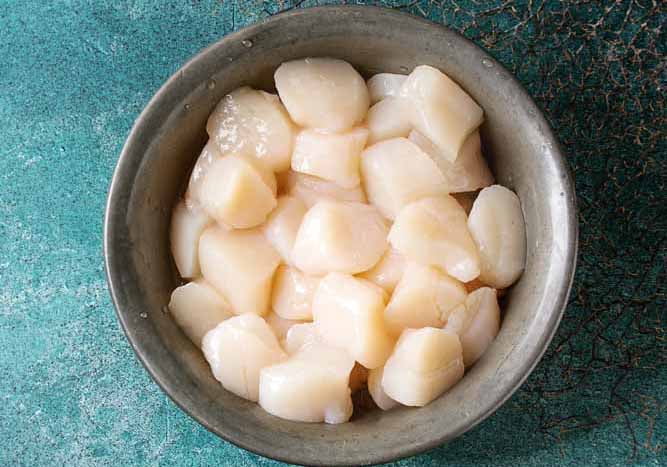Introduction
Scallops are a beloved delicacy, enjoyed for their tender texture and rich flavor. But when you’re standing in front of the seafood counter or exploring menu options, a common question arises: Can you eat scallops raw? Whether you’re an adventurous foodie or cautious eater, understanding the safety and preparation of raw scallops is essential.
In this guide, we’ll dive into whether raw scallops are safe to eat, how to enjoy them, their unique taste, and tips for ensuring the freshest scallops for your culinary delight.
Can You Eat Raw Scallops?
Yes, you can eat raw scallops, and many seafood enthusiasts argue they’re at their most delicious in their natural state. Raw scallops are prized for their sweet, delicate flavor and buttery texture. In fact, freshly caught scallops are often enjoyed straight from the sea by fishermen.
However, eating raw scallops does come with potential risks. Since scallops are mollusks, they can harbor harmful bacteria, viruses, or parasites from their environment. Therefore, ensuring the freshness and origin of scallops is critical when consuming them raw.
How to Safely Enjoy Raw Scallops
If you’re planning to eat scallops raw, here are some essential tips:
- Choose Fresh, High-Quality Scallops
- Opt for “dry-packed” scallops, which are free from preservatives.
- Look for scallops labeled as sushi-grade or sashimi-grade, indicating they are safe for raw consumption.
- Check the Appearance and Smell
- Fresh scallops should have a mild ocean scent, not a fishy odor.
- The meat should be firm, with a creamy white, pink, or orange hue.
- Clean Properly
- Remove the roe and any remaining grit.
- Rinse scallops thoroughly under cold water before preparation.
- Serve Simply
- Enjoy raw scallops as sashimi, carpaccio, or ceviche.
- Enhance their natural flavor with a drizzle of olive oil, fresh lemon juice, and a sprinkle of sea salt.
What Do Raw Scallops Taste Like?
Raw scallops offer a uniquely sweet, buttery flavor with a tender, melt-in-your-mouth texture. Their taste is often compared to a mix of crab and shrimp, with a slight oceanic undertone. Unlike cooked scallops, their natural sweetness shines through, making them a popular choice for seafood lovers.
Risks of Eating Raw Scallops
While raw scallops are delicious, they come with health risks:
- Bacterial Contamination: Scallops can harbor bacteria like Salmonella or Vibrio if harvested from polluted waters.
- Parasites: Improperly sourced scallops may carry parasites that pose a health hazard.
- Shellfish Allergies: Some individuals may experience allergic reactions to raw mollusks.
To minimize risks:
- Source scallops from reputable suppliers.
- Avoid consuming raw scallops if you’re pregnant, immunocompromised, or have underlying health issues.
How to Tell if Scallops Are Fresh
Fresh scallops are key to a safe and enjoyable raw dining experience. Here’s how to identify them:
- Smell: Fresh scallops should have a faint ocean scent, not a strong fishy odor.
- Texture: They should feel firm and slightly springy, not slimy.
- Color: Fresh scallops range from creamy white to light pink or orange. Avoid scallops that appear overly white, as they may be treated with preservatives.
FAQs About Eating Raw Scallops
1. Are raw scallops safe for everyone?
Raw scallops are generally safe when sourced and handled properly, but they are not recommended for individuals with compromised immune systems or pregnant women.
2. How can I reduce the risks of eating raw scallops?
Purchase sushi-grade scallops from reputable suppliers, store them properly, and consume them promptly.
3. Can frozen scallops be eaten raw?
Yes, but only if they are labeled sushi-grade or intended for raw consumption. Freezing kills many parasites but does not eliminate all risks.
4. What’s the difference between wet-packed and dry-packed scallops?
Wet-packed scallops are treated with preservatives to retain moisture, while dry-packed scallops are untreated and ideal for raw consumption.
5. Do raw scallops taste different from cooked scallops?
Yes, raw scallops are sweeter and more delicate, while cooked scallops develop a richer, more robust flavor.
Conclusion
Raw scallops are a true delicacy, offering a unique flavor and texture that many seafood lovers adore. While they are safe to eat when fresh and properly prepared, it’s essential to source them from reputable suppliers and handle them with care.
Whether you enjoy them as sashimi, ceviche, or carpaccio, raw scallops are a delightful treat for any seafood enthusiast. Bon appétit!
